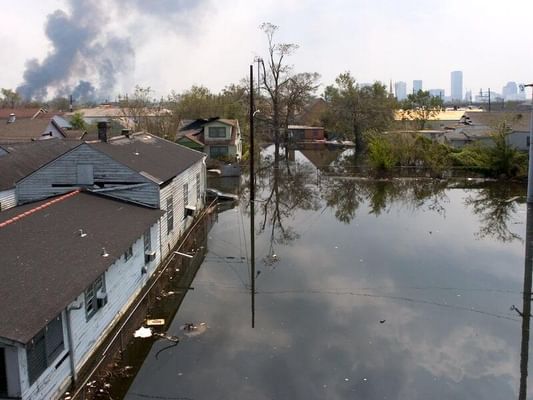- Undergraduate
Bachelor's Degrees
Bachelor of ArtsBachelor of EngineeringDual-Degree ProgramUndergraduate AdmissionsUndergraduate Experience
- Graduate
Graduate Experience
- Research
- Entrepreneurship
- Community
- About
-
Search
All Thayer News

New Study Aims to Improve Equity in Flood Risk Management
Apr 30, 2024 | by Catha Mayor
A study led by Dartmouth Engineering provides improved practices for how to define and measure equity in flood-risk management. The results could help decision-makers around the world achieve more equitable outcomes from environmental public policy.

Flooded Lake Forest area of New Orleans, Louisiana after Hurricane Katrina. (Photo by joeynick/iStockphoto)
"Equity is a difficult goal to meet in managing flood risks because people disagree about what is equitable," says Adam Pollack, postdoctoral research associate and first author on the study published today in Nature Sustainability. "Decision-makers and researchers struggle to overcome this challenge because they often don't measure equity clearly. Our team synthesized how equity has been, and can be, defined and measured in flood-risk research."
Flooding is a common and devastating natural disaster, and both leaders and their constituents struggle to gauge whether risk-management strategies meet diverse expectations about equity. Providing better practices for quantifying equity can make it easier to see if their views on equity are being met.
"Conclusions about equity often depend on which principles, value judgements, and perspectives the analysts adopt," says Klaus Keller, Dartmouth's Hodgson Distinguished Professor of Engineering and the study's senior author. "This is a complex multidisciplinary problem. We provided expertise in both risk analysis and engineering, but our team also included a philosopher from Penn State, and an economist from the Environmental Defense Fund. We hope the guidance we provide can facilitate agreements about equity, not only for managing flood risks, but also for other environmental management settings where equity is important."
For contacts and other media information visit our Media Resources page.
